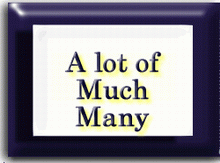Login form
Unit 14 Dialogues - Much/Many/A Lot
 1.We need to go shopping.
1.We need to go shopping.
I don't think so, we've got a lot of food here.
We don't have much milk or bread, and we don't have much water.
Oh, OK. Lets go shopping this evening.
-----
2.
How's your university?
It's great. I have lots of friends and there are a lot of great professors. I don't have much money, but that's OK. Also I'm really busy these days, so I don't have much time.
Are you enjoying it?
Sure, it's going well.
-----
3.
How many students are in your class?
We don't have many students, just eight.
That's great! You can study a lot.
Right. And I can talk to the teacher a lot as well. That's good.
Do you have many friends in your class?
Yes, I go out with them a lot.
--------
Key Vocabulary
|
shopping |
university |
Grammar
1. Quantifiers - Much / Many / A Lot of
Quantifiers are words that show how much there is of something - they show quantity. Much, many, and a lot of indicate a large quantity of something, for example "I have a lot of milk" means I have a large quantity of milk.
Much
Much is used with uncountable nouns, and is generally used in negative statements and questions. It's uncommon to use much in positive statements. For example:
- I don't have much money.
- Do you have much time?
- "I have much time." This sounds unusual.
Many
Many is used with plural countable nouns, and is often used in negative statements and questions. It is also used in positive statements however. For example:
- I don't have many apples.
- Do you have many friends?
- Many people come here in summer.
Much and many can be used in affirmative statements, but give a more formal meaning. For example:
- He has many good friends from Harvard University.
Much and many often appear in short answers. For example:
- Do you see your family much?
- No, not much.
A lot of
A lot of is used with uncountable and countable nouns, and is generally used for affirmative statements. For example:
- I have a lot of friends.
- I have a lot of time.
A lot of is also used in questions, especially when you expect a positive response. Although it is often said that much and many are used for questions, we usually use them for questions which expect a negative response. For example:
- Do you want a lot of pizza?
I expect you want to eat a lot.
- Do you want much pizza?
This sounds unusual, as though I expect you don't want to eat much.
Lots of can be used in the same way as a lot of, often in informal speech. For example:
- I have lots of time.
- I have a lot of time.
How much / many?
How much is used to ask about the price of something. For example:
- How much is it?
- How much is that dog in the window?
How much and How many are used to ask about quantity. For example:
- How much money do you have?
- How many apples does he have?
-----

